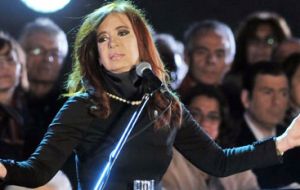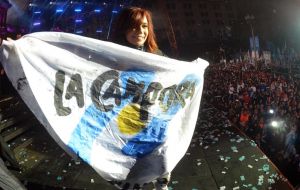MercoPress. South Atlantic News Agency
CFK calls for ‘empowerment of the people’ and another ten years of Kirchnerism
 “Equality is the grand symbol of this decade and of those to come”
“Equality is the grand symbol of this decade and of those to come” Argentine President Cristina Fernandez rallied a huge crowd Saturday night celebrating the 10-year government that she and her late husband Nestor Kirchner began in 2003. Her voice breaking, she called it a victorious decade, “won not by a government but by the people” and called for “the empowerment of the people” to defend what has been achieved in the ‘won decade’.
The rally-show which included artistic groups, music and fire works took place at a huge stage mounted next to Government House in the emblematic Plaza de Mayo. The government’s grass roots organizations together with friendly unions are estimated to have managed to bring to the plaza the estimated target of 450.000 people.
Cristina Fernández arrived at the Plaza de Mayo surrounded by Vice President Amado Boudou, pro-K governors, all cabinet ministers and human rights leaders such as the head of human rights group Grandmothers of Plaza de Mayo Estela De Carlotto. She showed at the main stage waving at the crowd as Argentina's national anthem began to be played by local artists.
The president delivered her nationally-televised speech recalling first her late husband and ex president Néstor Kirchner. A paradox, she said, the same day Argentina marks its National Day and the beginning of the independence from Spain, the “less voted president” among all “democratic governments came to lead the most important process of transformation and change of the past decades”.
Next October Cristina Fernandez faces a mid term election that will decide if she has enough votes in congress to undo constitutional term limits and extend her rule beyond 2015. But she suggested Saturday night that she won't try. She said “I'm not eternal, nor do I want to be”.
Nevertheless she needs to keep a strong unified group in Congress if she does not want to run the luck of her (lame duck) predecessors, when the last two years of government are marked by a weakened government and a major struggle in the hegemonic Peronist movement to find a successor which enormously erodes the power of the outgoing president and leaves the economy is exposed.
In her speech Cristina Fernandez promised that putting human rights violators on trial and pushing to put more of Argentina's wealth in the hands of its poorest people will continue to be the pillars of her government: “Equality is the grand symbol of this decade and of those to come”.
Her opponents took aim at the “decade won” theme of the rally noting that the years of strong economic growth have ended, and saying that if this is what victory looks like, Argentina is in big trouble.
“It is necessary to empower the people, society with all the reforms and conquests of these ten years so never again nobody can snatch them away” said Cristina Fernandez and blasted those who argue that Kirchnerism is over.
“I many times read in capital letters that they talk about Kirchnerism and the end of an era. I wonder and ask you too, does the end of a government mean the end of an era or are they actually saying that when I leave office everything we have conquered in this won decade will be over?”, she affirmed.
Whether the Kirchners' decade will be remembered for its historic achievements or its missed opportunities depends on whom you talk with in Argentina, where society is bitterly divided over their legacy.
The Kirchner years, at least the first, deserve credit for fostering 7% average growth and restoring power to the presidency. Kirchner was inaugurated on May 25, 2003 at a chaotic time; the country was still suffering from its 2001 crisis, and poverty was extreme.
The Kirchners began an era of social inclusion, external debt reduction and state intervention that was the exact opposite of the privatization binge and anything-goes capitalism that characterized Argentina in the 1990s.
Ten years later and going it alone after her husband died of a heart attack Cristina Fernandez has intensified her government's control over the economy and diverted billions of dollars more to subsidizing the poor.
However, her approval ratings have dropped sharply recently amid rising inflation and crime, corruption allegations involving top appointees and allied businessmen; increasingly heavy-handed economic controls; and efforts to transform the justice system and control the media. Critics say the real goal is eliminating challengers to presidential power.
Thousands of citizens that have joined a series of pot-banging protests in recent months, and the crowd gathering in the Plaza de Mayo to hear Cristina Fernandez speak Saturday night was intended to provide a powerful counterpoint. Hundreds of thousands of people were bused in by the “organized and united” network of pro-government groups, and their flags and huge TV screens were installed in nearby streets.
“We need memory, truth and justice; without them there is no unity and we need unity for this process of economic transformation and social inclusion”, the Argentine president said.
“Social inclusion” under the Kirchners has involved providing billions of dollars in cash welfare payments families with children and people working in the informal economy. The government has raised pensions and minimum wages, and directed vast amounts of government revenue to keep the economy moving.
“Unemployment has gone from 25% to 7% ten years later ... in an economy that grew as fast as China,” said Ramiro Castineira, an economic analyst with the Econometrica firm.
But it is also true that intervening in the government statistics service, Indec in 2007 was a critical mistake. Ever since, official annual inflation has refused to budge over 10%, even as Argentine shoppers watch prices double and triple each year. Many other statistics based on consumer prices have become widely disregarded including those referred to unemployment, poverty, inflation and inequality.
“Misrepresenting the numbers was a strong blow to market confidence; that raised the country risk and made it impossible for Argentina to take on foreign debt. That's why the government turned to expanding the money supply,” Castineira agreed.
Since 2008, the government has sought to capture more of the windfall profits from soy exports. But that alone couldn't finance the spending, so it printed more money and changed currency and tax rules forcing businesses to keep profits inside Argentina. That dissuaded investors, spurred capital flight and pushed annual inflation to as much 30% right now, private analysts say.
Economic instability now threatens to undo much of what the Kirchners accomplished. And in one of her latest almost desperate moves blames businesspeople for the rise in prices and has invited young militants, organized in neighborhood militias to visit stores and supermarkets and check on prices. The task was recommended mainly to La Campora, the youth group privileged by ‘Mom’ Cristina and which is headed by her son Maximo Kirchner.





Top Comments
Disclaimer & comment rules-

-

-

Read all commentsOh dear.
May 27th, 2013 - 07:19 am 010 more years?!?!
1 Anglotino
May 27th, 2013 - 07:50 am 0Three little words my friend......
Oh.......My..........God!!!!
“Power to the People”
May 27th, 2013 - 07:52 am 0Tooting Popular Front
Commenting for this story is now closed.
If you have a Facebook account, become a fan and comment on our Facebook Page!